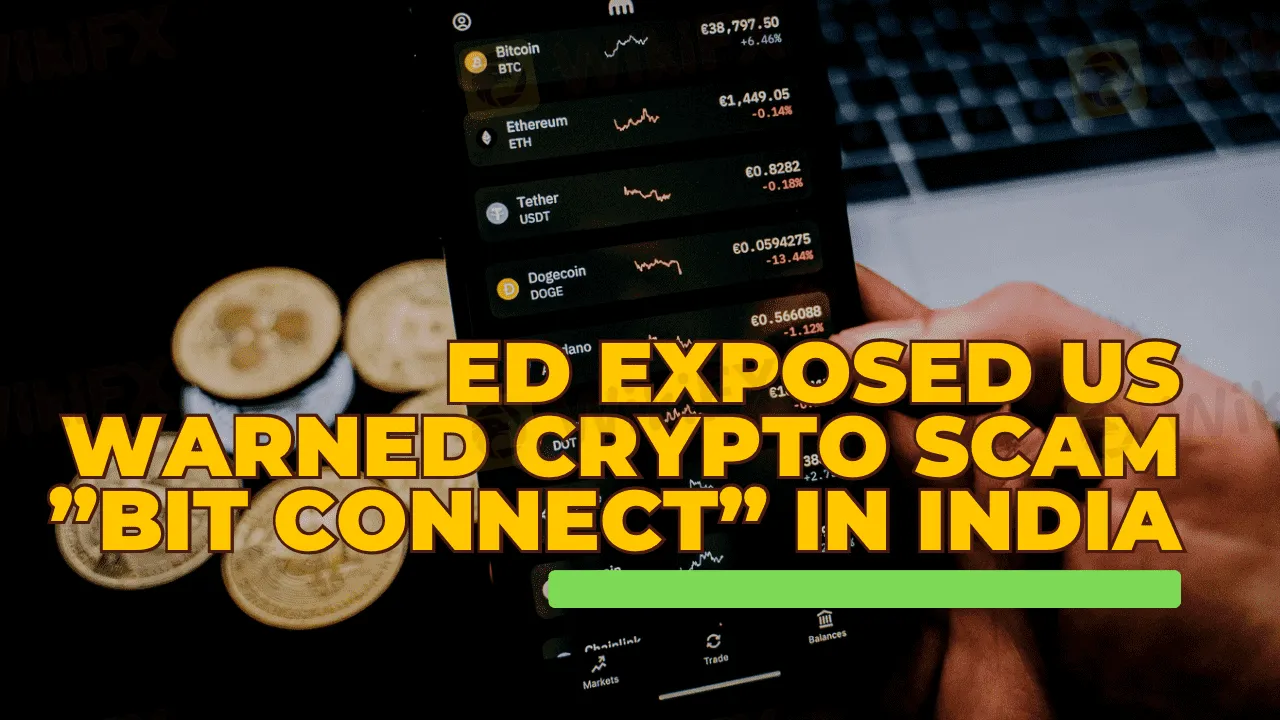简体中文
繁體中文
English
Pусский
日本語
ภาษาไทย
Tiếng Việt
Bahasa Indonesia
Español
हिन्दी
Filippiiniläinen
Français
Deutsch
Português
Türkçe
한국어
العربية
ED Exposed US Warned Crypto Scam ”Bit Connect”
Abstract:The Indian Enforcement Directorate (ED) recently exposed a crypto scam from Bitconnect. The investigation took place between February 11th and 15th, 2025. The authority recovered bitcoin worth approximately Rs 1,646 crore & Rs 13.50 lakh in cash, a Lexus car, and digital devices. This investigation was conducted under the provisions of the Prevention of Money Laundering Act (PMLA) of 2002.

The Indian Enforcement Directorate (ED) recently exposed a crypto scam from Bitconnect. The investigation took place between February 11th and 15th, 2025. The authority recovered bitcoin worth approximately Rs 1,646 crore & Rs 13.50 lakh in cash, a Lexus car, and digital devices. This investigation was conducted under the provisions of the Prevention of Money Laundering Act (PMLA) of 2002.

How did ED reach out to this scam?
After receiving FIRs from the Surat Police Station's Crime Investigation Department, the ED started an investigation. According to the FIR, Bitconnect's founder, Satish Kumbhani, and his colleagues created a plan known as the 'lending program.' Between November 2016 and January 2018, the scammers guaranteed a huge return of 40%. Investors around the world were attracted to this scam and invested in this scheme.
The main culprit, Satish Kumbhani, and his group enticed investors by claiming that a volatility software trading bot would manage funds. They even showed fictitious returns on its website, suggesting annualized gains of 3,700%.

The authority said the network of transactions was purposefully hidden by various crypto wallets and dark web transactions. Agents were capable of identifying the main digital wallets and finding the location where the illicit money was kept.
But ED revealed there is no such bot that exists. “ED investigation revealed that during the period from November 2016 to January 2018, Satish Kumbhani, the promoter of Bitconnect Coin (a cryptocurrency), established a worldwide network of promoters and induced the public to invest in various investment schemes related to Bitconnect Coin by offering huge returns,” said a senior ED official.
In 2022, the US Securities and Exchange Commission (SEC) warned against Bitconnect and its scheme “Landing Program.”

Disclaimer:
The views in this article only represent the author's personal views, and do not constitute investment advice on this platform. This platform does not guarantee the accuracy, completeness and timeliness of the information in the article, and will not be liable for any loss caused by the use of or reliance on the information in the article.
Read more

Will natural disasters have an impact on the forex market?
The forex market is known for its rapid responses to global events, but the influence of natural disasters, such as earthquakes and typhoons, can be less straightforward. While headlines may scream about catastrophic damage and economic disruption, the long-term effects on currency values often depend on a blend of immediate shock and underlying economic fundamentals.

Why does your mood hinder you from getting the maximum return from an investment?
Investment decisions are rarely made in a vacuum. Aside from the objective data and market trends, our emotions—and our overall mood—play a crucial role in shaping our financial outcomes. Whether you’re feeling overconfident after a win or anxious after a loss, these emotional states can skew your decision-making process, ultimately affecting your investment returns.

Stock Market Trading Volume Drops by 97.58 Billion Naira This Month
In February, Nigeria's stock market trading volume dropped by 97.58 billion naira, with foreign investors pulling back. Can domestic investors sustain the market?

Navigating the Intersection of Forex Markets, AI Technology, and Fintech
The financial world is transforming, driven by the rapid integration of artificial intelligence (AI) and innovative fintech solutions. This change is most apparent in forex markets, where algorithmic trading and deep learning are redefining strategies, risk management, and decision-making. In this article, we explore how AI-driven technologies are not only revolutionizing forex trading but are also propelling fintech innovations that enhance customer experiences, bolster security, and unlock new market opportunities.
WikiFX Broker
Latest News
How Crypto Trading Transforms FX and CFD Brokerage Industry
UK would not hesitate to retaliate against US tariffs - No 10 sources
FCA Warns Against 10 Unlicensed or Clone Firms
CySEC Warns Against 14 Unlicensed Investment Websites
Top Currency Pairs to Watch for Profit This Week - March 31, 2025
Will natural disasters have an impact on the forex market?
Philippines Deports 29 Indonesians Linked to Online Scam Syndicate in Manila
Navigating the Intersection of Forex Markets, AI Technology, and Fintech
Exposed: Deceptive World of Fake Trading Gurus – Don’t Get Fooled!
AI-Powered Strategies to Improve Profits in Forex Trading
Currency Calculator







